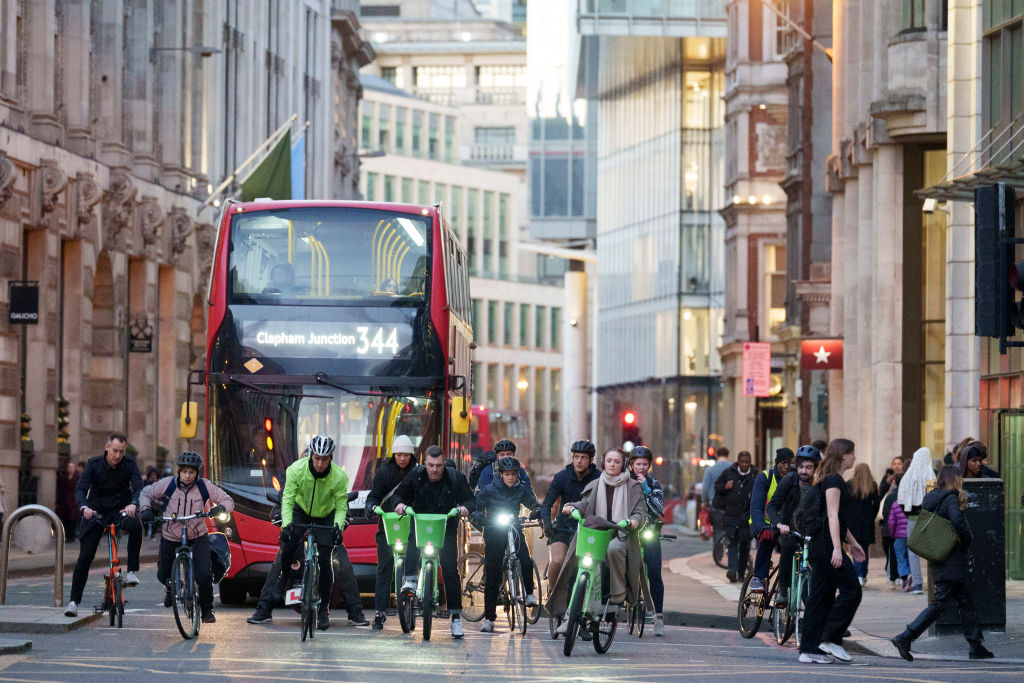How do we create a 'culture of courteousness' within cycling?
As the City of London police proposes higher fines for dangerous cyclists, we ask what could be done to create a safer, and more equitable cycling culture in the capital


The latest race content, interviews, features, reviews and expert buying guides, direct to your inbox!
You are now subscribed
Your newsletter sign-up was successful
Courteous – it’s a word rarely used beyond the bounds of school reports, or dress-downs from teachers in front of noisy classrooms, but it cropped up in an online discussion about cycling penalties last month, about how we might create a “culture of courteousness” in cycling.
The meeting was in response to a paper submitted by the City of London Police to the Corporation’s Streets and Walkways Sub-Committee. The paper proposes tougher penalties for cyclists who display "dangerous, anti-social and nuisance cycling behaviours", such as repeatedly running red lights, or cycling on pavements.
National law currently caps fines for cycling offences at £50, though the City of London Police is investigating whether it can use Community Protection Warnings and Notices to implement an "escalation pathway" that will see tougher penalties for repeat offenders, including prosecution.
The BBC reported that during the meeting, common councillor Jacqueline Webster asked "whether more could be done to promote a 'culture of courteousness' among cyclists".
Webster's comment was written in relative isolation – I can't be entirely sure of the context in which it was said, but it triggered an interesting question: what exactly is a "culture of courteousness" in cycling? And would such a culture emerge from stricter penalties for cyclists?
There have been few moments in recent years when regular scheduling has, for a moment, been turned on its head. On 5 September, the RMT union led a coordinated strike across the capital, halting London's underground across seven days. With no tube to hop on to get to work, one in five Londoners (21%) cycled instead, according to a YouGov x Lime study.
In the aftermath of that two-wheeled, 24-hour revolution, 28% of Londoners said they would be more likely to cycle regularly. One Reddit user said she is looking into getting a folding bike after loving her new, compulsory daily cycle commute on a hire bike: “The fresh air, the wind in the face, and the almost meditative focus from keeping track of my surroundings were invigorating!” she wrote.
The latest race content, interviews, features, reviews and expert buying guides, direct to your inbox!
This comes at a time when more of us are cycling than ever before. The rise in cycling in London is due in part to investment by Transport for London and the Corporation in cycle lanes and bike parking, which has helped boost the numbers of daily cyclists from 8,000 in 1999 to 52,000 in 2024 - the city’s 400km of Cycleways make the cycling network longer than the underground.
But London’s transport network still prioritises motor vehicles, with London consistently rated lower than other European cities for its amenability to cyclists. And, whilst the government did announce a £616 million pledge for walking and cycling in its 2025 spending review, it remains a significantly lower investment than was promised in 2021/22 and 2022/23.
“London over the past few years has made great strides in enabling more cycling in the capital and these stats prove it,” James Scott, Director of Behaviour Change at Cycling UK, said in response to the YouGov survey.
“Building transport networks that let people choose how they travel is essential to making a system that works for us all, if the trains aren’t working, your car is in the shop, or you just want some fresh air. Whether it’s your own bike you ride or one you hire, what matters is we have more ways to get where we want to go.”
I'd say that a courteous culture is a two-way street. One where effective, safe, cycling infrastructure is invested in, and which cyclists feel safe enough to use, and to respect.
In order to implement the proposed ideas in the paper, the City of London recognise that, as it is not a current “policy objective” in the City Police’s 2025-28 policing plan, they would have to redirect resources to it, meaning “taking them away from agreed priorities such as tackling theft and violence.”
While the City of London Police haven't said categorically that resources would be redirected away from theft (though the report marks 'No' to the question: 'Does this proposal require extra revenue and/or capital spending?') it strikes something important; the nation-wide failure to repatriate bikes back to their owners is, unfortunately, a gaping hole in the utopic vision of a courteous cycling culture.
“You’re more likely to win a lottery prize than catch a London bike thief,” read Jim Waterson’s headline in London Centric, in reference to the 0.6% bike thieves who faced prosecution by the Metropolitan police between January and July of this year.
“This means that if you reported a bike stolen to the Met police this year, there’s less than 1% chance of ever seeing the bike ever again, or even hearing of anyone being prosecuted for stealing it,” Waterson wrote.
“That’s well below the odds of winning money when you buy a ticket for a Lotto draw.”
Dangerous cycling should be penalised – I agree with this, on the whole. But if one objective of this is to nurture some kind of culture around cycling, then simply imposing tougher penalties for its misuse seems heavy handed.
Cycling is a risky business in the capital. The likelihood of getting your bike stolen is elevated, and while some cycle infrastructure in the city makes it a safer place to ride, 3,696 people were killed or seriously injured in 2024 on London's roads, 81% of whom were cyclists or motorcyclists.
Cultivating a "culture of courteousness" in cycling is therefore a complex business. I'm not sure how we will get there, but its a fascinating kernel to contend with - what would a "culture of courteousness" look like to you? Let me know in the comments below.

Meg is a news writer for Cycling Weekly. In her time around cycling, Meg is a podcast producer and lover of anything that gets her outside, and moving.
From the Welsh-English borderlands, Meg's first taste of cycling was downhill - she's now learning to love the up, and swapping her full-sus for gravel (for the most part!).
You must confirm your public display name before commenting
Please logout and then login again, you will then be prompted to enter your display name.